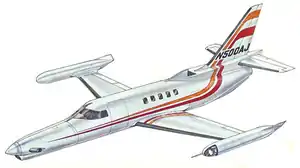Gulfstream American Hustler
The Gulfstream American Hustler was a 1970s American mixed-power executive/utility aircraft designed by American Jet Industries (later Gulfstream American). The aircraft had a nose-mounted turboprop and a tail-mounted turbofan.
| Hustler | |
|---|---|
 | |
| Role | Executive or utility aircraft |
| Manufacturer | American Jet Industries/Gulfstream American |
| First flight | January 11, 1978 |
| Number built | 1 |
| Developed into | Gulfstream Peregrine 600 |
Development
In 1974, American Jet Industries started work on a design for a seven-seat executive transport, powered by a Pratt & Whitney Canada PT6 turboprop engine in the nose supplemented by a Williams Research Corporation WR19-3-1 turbofan mounted in the tail. The turbofan was originally intended to be a standby emergency power unit that could also be used if extra thrust was needed for take-off. The prototype, designated Hustler 400, first flew on January 11 1978. The Hustler was a low-wing cantilever monoplane with retractable tricycle landing gear, and a high-mounted tailplane.
It was originally intended that the Hustler would be certified as a single-engined aircraft because the Williams turbofan had not been certified for use as an aircraft propulsion unit. But the company - by then renamed Gulfstream American - decided it should be approved as a twin-engined aircraft, and the Williams turbofan was replaced with a Pratt & Whitney Canada JT15D turbofan. To enable the new engine to be fitted a 2 ft 8 in (0.81 m) extension to the forwards fuselage was implemented, allowing the cabin entrance door to be moved in front of the wing, and other aerodynamic changes. were made The intake for the jet engine was also moved from the lower rear fuselage to the base of the fin.
Another change was made in 1979 when the front engine was replaced by a Garrett TPE331 turboprop, and the aircraft was re-designated the Hustler 500. The aircraft was flown in this configuration in 1981; however the programme was suspended due to a recession in the general aviation market. Elements of the design were used in the prototype Peregrine 600 jet trainer.
Variants
- Hustler 400
- Prototype mixed-power aircraft with a Pratt & Whitney Canada PT6A-41 in the nose.
- Hustler 500
- Modified aircraft with a Garrett TPE331 Turboprop in the nose.
Specifications (Hustler 500)
General characteristics
- Crew: One
- Capacity: Four or five passengers
- Length: 41 ft 3 in (12.57 m)
- Wingspan: 34 ft 5 in (10.49 m)
- Height: 13 ft 2.5 in (4.03 m)
- Wing area: 190.71 sq ft (17.72 m2)
- Empty weight: 5,430 lb (2,463 kg)
- Gross weight: 10,000 lb (4,536 kg)
- Powerplant: 1 × Garrett TPE331-10-501 turboprop , 900 hp (671 kW)
- Powerplant: 1 × Pratt & Whitney Canada JT15D-1 turbofan , 2,200 lbf (9.8 kN) thrust
Performance
- Maximum speed: 402 mph (647 km/h, 349 kn)
- Range: 2,303 mi (3,706 km, 2,001 nmi)
- Service ceiling: 38,000 ft (11,580 m)
Further reading
- The Illustrated Encyclopedia of Aircraft (Part Work 1982-1985), 1985, Orbis Publishing, Page 2055
- "Hustler 500 Brochure" (PDF). American Jet. 1978.